A Conversation With Julia London
by Claire E. White
Bestselling romance novelist Julia London was raised on a ranch in West Texas, where

|
Undaunted, she eventually discovered there were other ways to meet boys. But more importantly, she knew at a tender age she was destined for great adventure. She was so certain of her destiny for adventure that at night she would fill spiral-bound notebooks with story after story fashioned after Kathleen Woodiwiss. All of them featured a heroine that looked just like her. She says her heroines in these early works were forever caught by cruel twists and turn of fate, forced into spine-tingling adventure, and always rescued by gorgeous young men who rather closely resembled those who cut wheat for her father.
Julia grew up and attended the University of Texas to earn degrees in government (something as far removed from plowing as she could think of), and eventually moved to Washington, D.C. She lived in the capitol for nine years, where she worked for the White House as a civil employee (not an intern, as she is quick to note.) She traveled a great deal, first across the United States, and then to Europe and the Middle East, all of which fueled the fantasies started on that ranch in West Texas.
Eventually she discovered that too much adventure can make a girl homesick, and she returned to Texas a few years ago to be near her family who is no longer in the ranching business.
One night, she ran out of reading material that could hold her interest long enough to keep from falling asleep. Even though she had a huge pile of unread romance, mystery, history, and even some of the classics, none of them looked interesting. So she decided to write her own story. She tracked down a spiral-bound notebook and picked up where she had left off some twenty years ago. Her first published book was Devil's Love. After she finished the manuscript, she trekked down to the nearest bookstore and found a guide to getting published. She then sent queries to four agents. Within one week, she had signed with an agent. Two weeks after that she had a contract with Dell. She's never looked back. Her next romance was Wicked Angel (Dell). But it was her next book, The Dangerous Gentleman, which really launched her career. The Dangerous Gentleman was the first in the Rogues of Regent Street series, which revolves around the lives of four English, aristocratic young rakes and how their lives and loves are affected by the tragic death of one of their group. The series has proven immensely popular. The next two books in the series are The Ruthless Charmer and The Beautiful Stranger (Dell).
Both The Dangerous Gentleman and The Ruthless Charmer have been nominated for the 2000 Reviewer Choice Awards, and both were named two of the best romances in 2000 by the Oakland Press. The Dangerous Gentleman received the 2000 Bookit Award, and The Ruthless Charmer was named the best historical regency by Romance Reviews Today. Her books are known for their snappy dialogue, intriguing plots and simmering sensuality. They also reveal her excellent sense of humor and positive outlook on life.
Julia now makes her adventure in Austin, Texas, where she is the County Manager over Justice and Public Safety, although she eventually hopes to write full-time. When she's not working or writing, you might find her spending time with her boyfriend, her adorable dogs Hugo and Maude, or polishing up her golf swing. Julia spoke to us about her road to publication, how she creates her characters, and even gives us a sneak peek of her Spring release, The Secret Lover.
What did you like to read when you were growing up?
Besides my sisters' diary, right? When I was a punk kid, I read a lot of Nancy Drew and Pippi Longstocking books. As a pre-teen, I read Mary Stewart and Jean Plaidy, which is where I think I first discovered a love for the historical novel. Then, when the raging hormones kicked in, I read and re-read the illicit copy of Valley of the Dolls that was making the rounds, and oh yea, my sisters' diary again. I also remember reading Charles Dickens, Louisa May Alcott, and just about anything with a historical bent to it.
Did you write stories when you were growing up? What were they about, and did you let anyone read them?
Oh geez, yes, I wrote tons of stories and they were all about meeeeee. In the first or second grade I wrote a story about a little girl who was rescued from Indians by the captain on Wagon Train (which, for all you babies out there, was an old TV show that featured a wagon train and lots of marauding Indians). My mom still has that one, and it is a hoot! In junior high I filled notebook after notebook with stories of-you guessed it-meeeee and all the guys I had a crush on. I also wrote stories for English class, but they were far less titillating than the ones stuffed under my bed, and those were never read by anyone. Unless, perhaps, it was a sister searching for a means of retaliation for the diary thing.
What did you enjoy most about growing up on a ranch in West Texas?
Well, at the time, I didn't like anything about it. I thought I was terribly deprived, way out there in the middle of nowhere with no one but a brother and two sisters to entertain me. But looking back on it now, I wouldn't trade those days for anything in the world. We were very close (still are) and spent an idyllic childhood playing in wheat fields. And I remember other things that I must have appreciated but didn't realize it -- like the vastness of the sky, the stark landscape that broke into canyons, the Spanish skirts, or walls of Palo Duro Canyon, the millions and millions of stars -- that area has a sense of awesomeness to it that I haven't seen in many other places.
How did you get interested in writing romance?
I never read a "romance" novel until I was in my thirties,
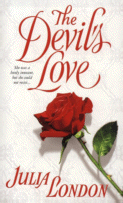
|
What led up to the publication of Devil's Love?
You know, I have thought about this many times, and I think I am one of the very lucky ones who happened to be in the right place at the right time. The first book I wrote was a medieval (I had just read a lot of Sharon Kay Penman books). The book was too long and too rambling, but I discovered an awful lot about sustaining a story over dozens of chapters. I threw that into the closet and wrote Devil's Love in 1997, went and got a book, How to Get Published, or something like that, sent a query to four agents simultaneously, and landed one within a week. I had a contract with Dell two weeks after that. I knew nothing about the industry or even the romance genre, I had never heard of the Romance Writer's Association or Romantic Times or Publisher's Weekly. Everything happened so quickly that I wondered if perhaps it really wasn't very hard to get published. I know better now, believe me! I know what a lucky, lucky chick I was in that my work hit my agent and the market at exactly the right time. I am truly humbled by my great dumb luck and eternally thankful for it.
What appeals to you about the 19th century as a background for your books?
Well, it certainly isn't the lack of bathroom facilities
| "I always told the men [I dated] up front -- it seemed funny to leave it out when they ask what you do. Their reactions to my writing was always very positive, and almost all of the guys I dated went out and got a book of mine -- in search of the juicy parts, naturally. Now that was embarrassing! Once they read that stuff, they always looked at me in a strange sort of 'do -- YOU -- do that?' way." |
The first book in the Rogues of the Regent Street series was The Dangerous Gentleman. What was your inspiration for this story?
The ugly truth is that a very good friend of mine from high school was killed in a car accident and his death struck me very hard. When someone loses their life so tragically and in their prime, one cannot help but question life and mortality and the why of it. My friend's death was sort of the genesis of the idea -- the Rogues became four wealthy young aristocrats who lived on the edge, but when one of them died tragically, the others tasted their own mortality and sort of woke up to the world around them. The Dangerous Gentleman, Adrian Spence, was the one who killed Phillip in a duel, which threw him into a cauldron of guilt. His story is about the quality of mercy. The Ruthless Charmer, Julian Dane, was the love 'em and leave 'em guy -- he learned that life was too short for that and experienced the true quality of love. And the last book, The Beautiful Stranger, was about Arthur Christian, the brother of Alex Christian from Wicked Angel. He was the one who saw his own life drifting by as a result of Phillip's death and learned the hard way how to appreciate the quality of life.
The Rogues of Regent Street series ended with
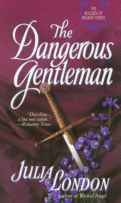
|
I wish there was more of Kerry McKinnon in me. I wanted to create someone who knew how to survive, and while I may know how to survive, I don't know if I would ever have the courage of a Kerry McKinnon. I guess all my heroines start out with some of Julia in them, but I try to create characters that are larger than life and who learn from their mistakes. Sadly, I must report that is most definitely not Julia London.
The hero in the story is Arthur, who has come to Scotland to wind up his friend's affairs, while racked with guilt that he couldn't save his friend. Arthur is a different type of hero from some of your others; he's lived his life mostly in the shadow of others, although he intends to change that. What was your greatest challenge in writing Arthur?
This is an easy question because Arthur was harder to write than any hero I have written to date. The challenge was making him less alpha and more vulnerable and human without making him a complete wimp. I struggled with the sort of emotions I thought Arthur was "supposed" to have, until I finally said to hell with it -- this guy was a snob who was captivated by the last person on earth who should have captivated him. Of course he would assume, once he had determined he wanted her, that she would come along and do things his way, for that was obviously the right way. The challenge was making that a sympathetic way for Arthur to react to his feelings.
Arthur and Kerry meet in a very funny scene indeed. What were you thinking when you wrote that scene?
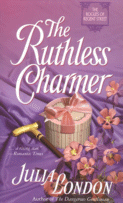
|
Will we be seeing any more of the characters from this series? What is your next book project?
Why thank you for the most excellent opportunity to plug The Secret Lover, which comes out next May. I truly meant to end the series with Arthur, but I had so much mail about Sophie Dane, Julian Dane's little sister in The Ruthless Charmer, that I just had to do her story. So while Sophie is not really a part of the Rogues, her story is certainly borne of that series.
Your books are known for bringing historical periods vividly to life. How do you approach the research for a new book?
I've always been a big fan of history and have read tons of historical fiction or biographies, or anything I could get my hands on, particularly about Europe. So I had quite a lot of knowledge about the time period already floating around in my head, and what I didn't know was lying around in a pretty sizable collection of reference materials. I have also traveled to Europe several times and been through every castle or regency house they will let you in, I think! And of course, I pick up lots of books when I am overseas. So each time I start a novel, I review the history of the period, before I start, and then rely on my library of reference materials.
I'd like to talk about the day to day details of writing. How do you fit in your writing with your day job and your personal relationships?
Let me just say it is becoming more and more difficult to do.
| "I don't really think in themes, but I intentionally put them in my books. A lot of the issues I deal with were as real then as they are today, and I like challenging the historical romance novel with doses of reality." |
When you start a new book, do you use outlines? How much of the story do you know before you start the actual writing?
I have tried it both ways -- outline, no outline -- and I prefer a detailed outline. Publishers buy my work on the basis of a proposal that outlines the story, so when I start a book, I do know who the characters are, what their conflict is, and where they are going. I even have some idea of how they are going to get there. But the characters still have the opportunity to take over and do it their way, and often do.
Although your books have lots of romance and humor, as well, they also touch on some more serious issues, such as class differences. Do you tend to think in themes when you write, or do they just creep into the stories?
I don't really think in themes, but I intentionally
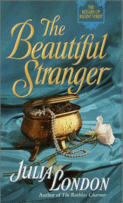
|
Do you ever think about writing a contemporary romance?
As a matter of fact...Okay, I haven't actually announced this officially, but I might as well do it here. I have signed to do a contemporary trilogy with Berkley Publishing. It is about a man who is dying of cancer, his three adult daughters, and the legacy he wishes to leave them. The first book will be out in the summer of 2003. I am also writing an historical short story for a Berkley anthology. I want to expand my reach in my writing, and having written six historical novels, it was time for a change. This seems like a logical progression to me. But I have not abandoned historicals -- I am just taking a break.
Do you think our modern society is less romantic than it used to be in years past? Could that be part of the incredible appeal of the historical romance genre?
I think our society may appear to be less romantic than a century ago, but I don't think it really is. Nonetheless, I do agree that the appeal of the historical is the sweeping romance of the whole era. Like I mentioned above, it seems men and women were different and times were less stressful -- or perhaps stressful in a different way.
What do you see as the future of ebooks and electronic publishing? Will we be still reading paperback romances in, say, ten years? Or will most people be downloading the books onto an ebook reader?
I really don't know much about ebooks or electronic publishing,
 Julia's dogs, Hugo and Maude. |
When do you disclose to potential beaux that you are a romance author? What kind of reactions have you gotten from dates? Is it intimidating, do you think?
It's been a couple of years since I dated, but I did do quite a bit of it (all right, go ahead, make of that what you will, haha). I always told the men up front -- it seemed funny to leave it out when they ask what you do. Their reactions to my writing was always very positive, and almost all of the guys I dated went out and got a book of mine -- in search of the juicy parts, naturally. Now that was embarrassing! Once they read that stuff, they always looked at me in a strange sort of "do-you-do that?" way. But I don't think any of them thought the writing was the least intimidating. My real job, on the other hand, is always intimidating to men. Always. But I'll save that rant and rave for the interview in the Public Administration magazines, hahaha.
How supportive of your writing career is your family?
Extremely supportive and very proud.
When you're not writing or working, what are your favorite ways to have fun?
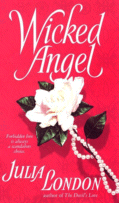
|
What's on your fantasy wish list for Christmas this year?
Oh, two very little, simple things. 1) Peace for us and the Muslim world. I honestly want that worse than anything else 2) Making the New York Times bestseller list hand in hand with my pal, J.K. Rowling (whom I have never met, but am sure would like me enormously). Hey, you said it was my fantasy!
Here's wishing everyone a prosperous and safe 2002. The Lord God knows we need it. Happy Holidays!
Return to the December-January 2002 issue of The IWJ.
More from Writers Write
